Unit 1 Where did you go on vacation Section A Grammar Focus-3c 课件(共29张PPT)
文档属性
| 名称 | Unit 1 Where did you go on vacation Section A Grammar Focus-3c 课件(共29张PPT) |  | |
| 格式 | pptx | ||
| 文件大小 | 7.2MB | ||
| 资源类型 | 教案 | ||
| 版本资源 | 人教新目标(Go for it)版 | ||
| 科目 | 英语 | ||
| 更新时间 | 2024-09-12 08:36:40 | ||
图片预览

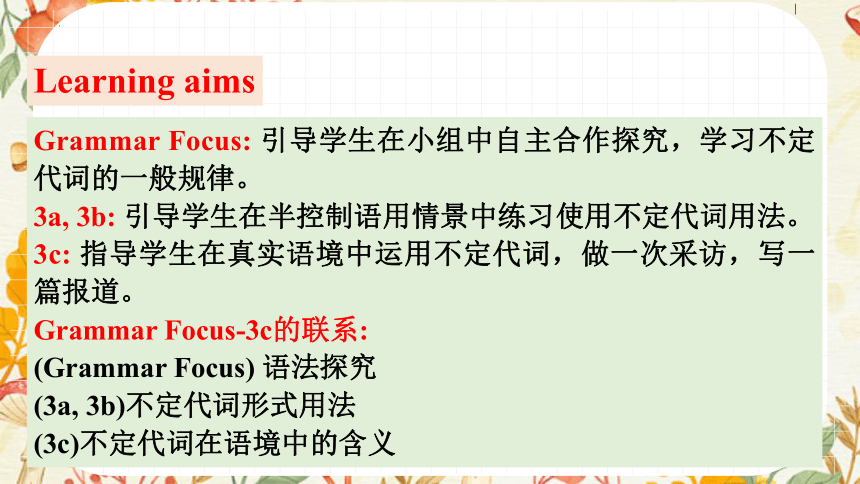
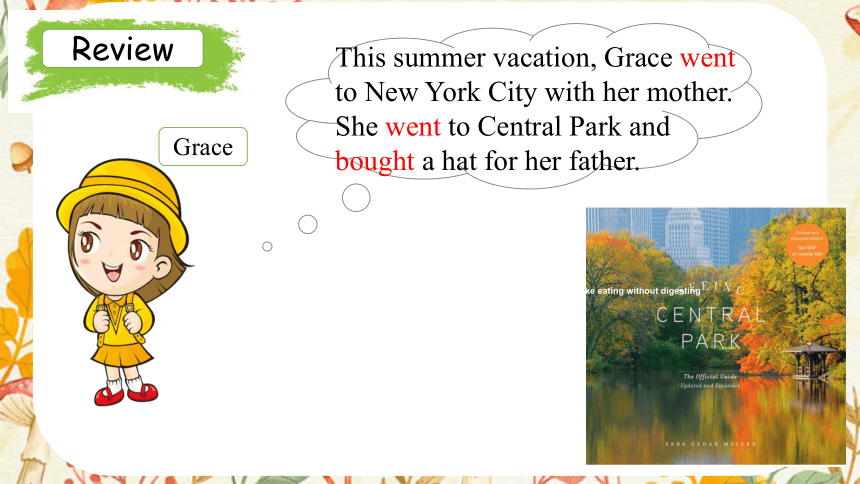
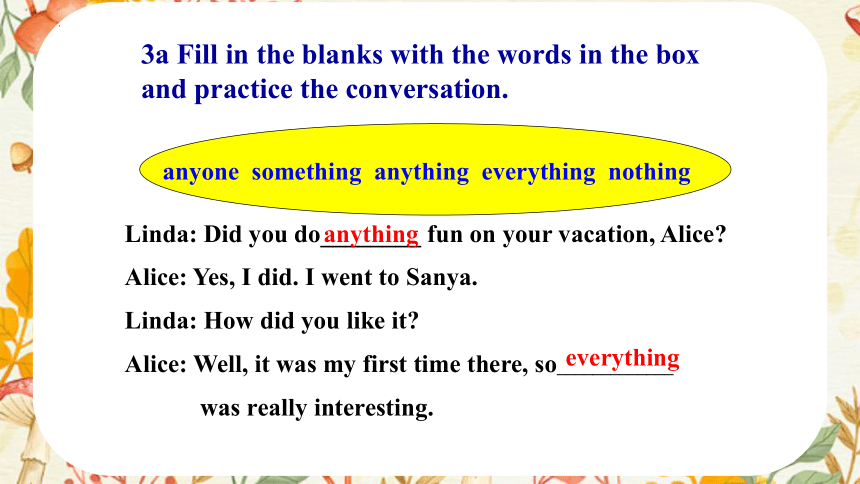
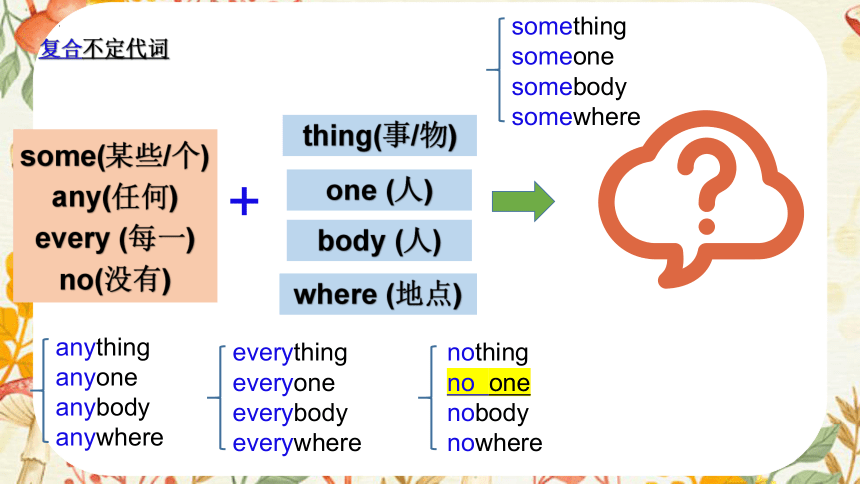
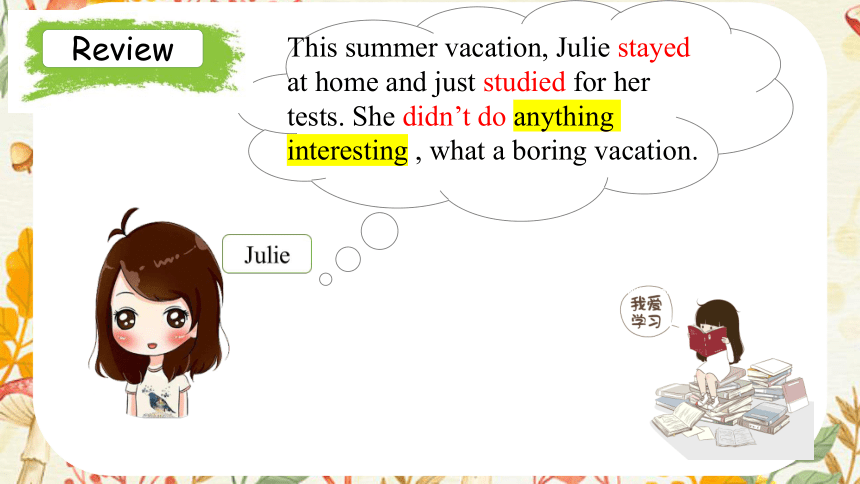
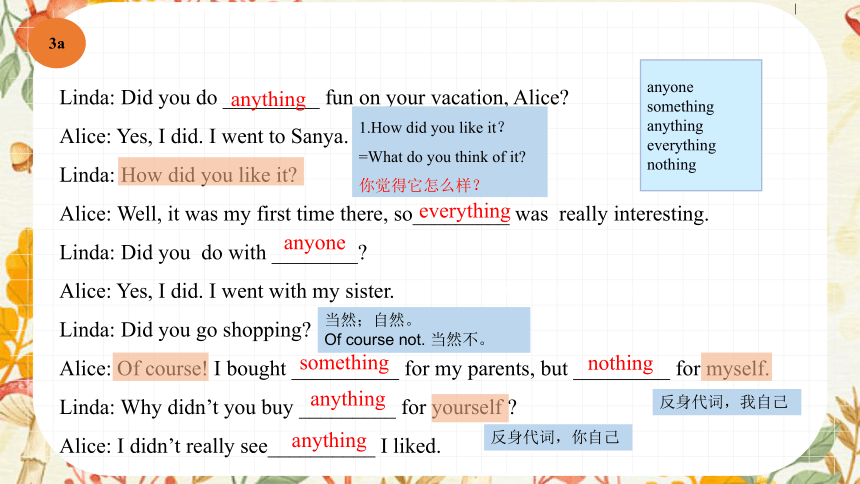
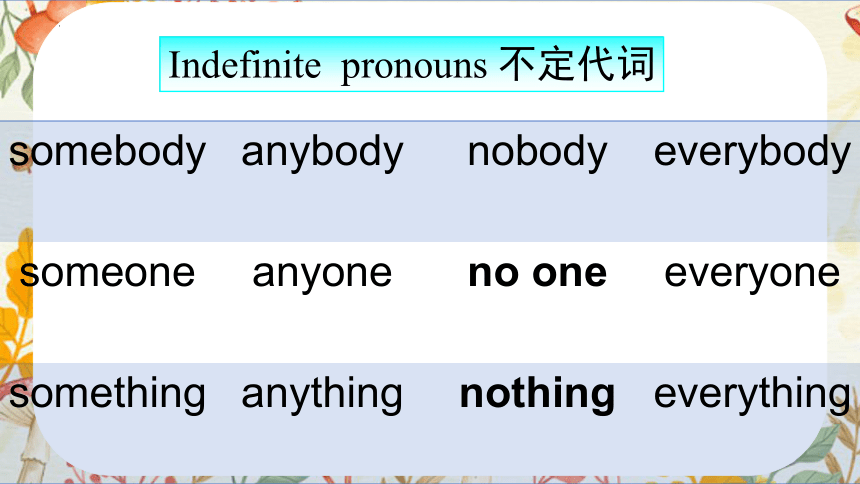
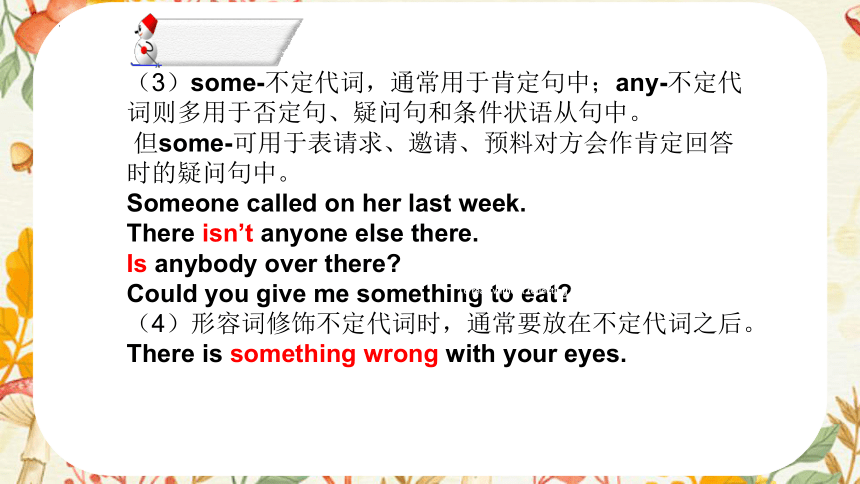
文档简介
(共29张PPT)
人教新目标Go For It八年级英语上册
Unit1 Where did you go on vacation SectionA Grammar Focus-3c
Grammar Focus: 引导学生在小组中自主合作探究,学习不定代词的一般规律。
3a, 3b: 引导学生在半控制语用情景中练习使用不定代词用法。
3c: 指导学生在真实语境中运用不定代词,做一次采访,写一篇报道。
Grammar Focus-3c的联系:
(Grammar Focus) 语法探究
(3a, 3b)不定代词形式用法
(3c)不定代词在语境中的含义
Learning aims
Grace
This summer vacation, Grace went to New York City with her mother. She went to Central Park and bought a hat for her father.
Review
To read without reflecting is like eating without digesting
Linda: Did you do________ fun on your vacation, Alice
Alice: Yes, I did. I went to Sanya.
Linda: How did you like it
Alice: Well, it was my first time there, so_____________
was really interesting.
3a Fill in the blanks with the words in the box and practice the conversation.
anyone something anything everything nothing
anything
everything
To read without reflecting is like eating without digesting
复合不定代词
some(某些/个)
any(任何)
every (每一)
no(没有)
thing(事/物)
one (人)
body (人)
where (地点)
+
something
someone
somebody
somewhere
anything
anyone
anybody
anywhere
nothing
no one
nobody
nowhere
everything
everyone
everybody
everywhere
This summer vacation, Julie stayed at home and just studied for her tests. She didn’t do anything interesting , what a boring vacation.
Review
To read without reflecting is like eating without digesting
3a
anyone
something
anything
everything
nothing
Linda: Did you do _________ fun on your vacation, Alice
Alice: Yes, I did. I went to Sanya.
Linda: How did you like it
Alice: Well, it was my first time there, so_________ was really interesting.
Linda: Did you do with ________
Alice: Yes, I did. I went with my sister.
Linda: Did you go shopping
Alice: Of course! I bought __________ for my parents, but _________ for myself.
Linda: Why didn’t you buy _________ for yourself
Alice: I didn’t really see__________ I liked.
anything
everything
anyone
something
nothing
anything
anything
当然;自然。
Of course not. 当然不。
反身代词,我自己
反身代词,你自己
1.How did you like it?
=What do you think of it
你觉得它怎么样?
To read without reflecting is like eating without digesting
somebody anybody nobody everybody
someone anyone no one everyone
something anything nothing everything
Indefinite pronouns 不定代词
To read without reflecting is like eating without digesting
(3)some-不定代词,通常用于肯定句中;any-不定代词则多用于否定句、疑问句和条件状语从句中。
但some-可用于表请求、邀请、预料对方会作肯定回答时的疑问句中。
Someone called on her last week.
There isn’t anyone else there.
Is anybody over there
Could you give me something to eat
(4)形容词修饰不定代词时,通常要放在不定代词之后。
There is something wrong with your eyes.
To read without reflecting is like eating without digesting
不定代词中考考点3
复合不定代词作主语,谓语动词用单数
1.Something ____ wrong with my watch.(be)
2.Well, everyone _______ to win. (want)
3. Nobody __________ what the weather will be like.(know)
4.There_________ something wrong with my bike.(be)
is
is
wants
knows
不定代词中考考点4
形容词修饰复合不定代词,要置于其后。
I meet someone interesting.
Did you meet anyone interesting
I want something special.
Did you eat anything delicious
3b
anything everything nothing everyone no one
anything
everyone/anyone
Everything
nothing
no one
Fill in the blanks in the email message with the words in the box.
合成不定代词和不定副词的构成及其用法
1.构成:由some, any, no, every分别加上-body, -thing, -one
构成的不定代词叫做合成不定代词;加上-where构成副词。
2.用法:
(1)合成不定代词在句中可以作主语,宾语或表语等。
Nobody will listen to him.
He wants something to eat.
(2)不定代词作主语时,谓语动词要用单数。
There is nothing wrong with the TV.
Everybody likes to be free.
Notes
To read without reflecting is like eating without digesting
Dear Bill,
How was your vacation Did you do ________ interesting Did________ in the family go with you I went to a friend’s farm in the countryside with my family. _________was great.
anything everything nothing everyone no one
3b Fill in the blanks in the e-mail message
with the words in the box.
anything
everyone
everything
be动词的一般过去时
am (is) →was are →were
1.肯定句:主语 + was/were + 其他.
He _____ at home yesterday.
We _____ happy at the party.
was
were
2.否定句:主语 + was/were not + 其他.
He _______ at home yesterday.
We _______ happy at the party.
wasn’t
weren’t
3.疑问句: Was/Were + 主语 + 其他
--_____ he at home yesterday
--Yes, he ____. /No, he ______.
Was
was
wasn’t
To read without reflecting is like eating without digesting
Free Talk
Talk about your family’s or friend’s vacation
interesting
boring
felt
were
was
relaxing
went
saw
visited
bought
ate
stayed
……
Use these words as much as possible!
To read without reflecting is like eating without digesting
Linda: Did you go with__________
Alice: Yes, I did. I went with my sister.
Linda: Did you go shopping
Alice: Of course! I bought__________ for my
parents, but _________for myself.
Linda: Why didn’t you buy__________ for yourself
Alice: I didn’t really see ____________I liked.
anyone
something
nothing
anything
anything
To read without reflecting is like eating without digesting
Ask your group questions about their last vacation. Then tell the class your results.
Did you… Everyone Someone No one
eat anything at a restaurant
read anything interesting
visit anyone in your family
buy anything
keep a diary
3c
写日记
To read without reflecting is like eating without digesting
1. 我想喝点东西。
I want _________ to drink
2.他什么也没说。
He didn't say __________ .
3.你需要我从超市带点什么东西吗?
Do you need _________ from the supermarket
4.那个派对上的人我一个都不认识。
I don't know ___________ at the party.
something
anything
anything
anyone
b
d
A: Where did Tina go on vacation
B: She went to the mountains.
A:Where did …go on vacation
B:/He …
Make conversations about the people in the picture.
Tina
Xiang Hua
Sally
Bob
Tom
Revision
go/went to New York City
stayed at home
visited his uncle
go/went to the mountains
go/went to summer camp
Grammar Express
指代不明的不定代词
To read without reflecting is like eating without digesting
Where did you go on vacation I went to New York City.
Did you go out with anyone No, no one was here. Everyone was on vacation.
Did you buy anything special Yes, I bought something for my father.
How was the food No, I bought nothing.
Did everyone have a good time Oh, yes. Everything was excellent.
Grammar Focus
Read and find the points.
To read without reflecting is like eating without digesting
1.不定代词 + adj. / else
Xiao Ming, he has something important to tell you.
Can you find anyone else
2.不定代词做主语,谓语动词用单三形式
Everything is possible!
3. no 系列的不定代词可与not...any 系列的不定代词替换。
eg. I bought nothing.= I______ buy ___________.
didn't
anything
(1) myself 与 yourself
反身代词 ,即表示“某人自己” 。
myself yourself himself herself itself
我自己 你自己 他自己 她自己 它自己
ourselves yourselves themselves 我们自己 你们自己 他们自己 第一二人称:所有格+self/selves
第三人称:宾格+self/selves
实义动词的一般过去时
1. 肯定句: 主语+动词过去式+其它
I went to the movie yesterday.
2. 否定句: 主语+didn’t+动词原形+其它
I ______ ____ to the movie yesterday.
3. 一般疑问句: Did +主语+动词原形+其它
--_____ you ____ to the movie yesterday
--Yes, I ____. /No, I ______.
didn’t go
Did go
did
didn’t
To read without reflecting is like eating without digesting
含be动词的一般过去时的句式
肯定句:
否定句:
一般疑问句:
及其回答
特殊疑问句:
主语 + was/were + 其他.
主语 + was not( wasn’t)/were not( weren’t) + 其他.
Was/Were + 主语 + 其他
Yes, 主语 + was/were.
No, 主语 + wasn’t/weren’t.
特殊疑问词+was/were + 其他
There ______ a school concert last Friday. As you can see, there ______ many people and all of them ______ very happy. Unluckily, Amy ______ (be not)at the concert, because she ______ sick. Where ______ she She ______ in hospital. ______ there many pianos No, there _______.
was
were
were
wasn’t
was
was
was
Were
weren't
Warming up
Please say the past forms of these verbs quickly.
do-did
do
go
play
take
visit
stay
see
read
is
see-saw
go-went
is-was
visit-visited
take-took
play-played
stay-stayed
read-read
Where did you go on vacation I went to New York City.
Did you go out with anyone No. No one was here. Everyone was on vacation.
Did you buy anything special Yes, I bought something for my father.
No, I bought nothing.
How was the food Everything tasted really good!
Did everyone have a good time Oh, yes. Everything was excellent.
Grammar Focus
How to ask about friends’ vacation
Summary
一般过去时
时间状语
yesterday, last ...,
...ago, just now, in...
基本句式
肯定句
否定句
一般疑问句及回答
动词变化
规则
变化
不规则变化
v.+ed
v.(以e结尾)+d
y变i加-ed
双写辅音字母加-ed
1. David is a tennis player. He to play tennis when he
was six years old.
A. begins B. will begin C. began D. has begun
2. — Alice has gone out.
— Oh, has she What time _____ she _____
A. has; gone B. will; go C. did; go D. is; going
3. — Alice has gone out.
— Oh, has she What time ______ she ______
A. has; gone B. will; go
C. did; go D. is; going
人教新目标Go For It八年级英语上册
Unit1 Where did you go on vacation SectionA Grammar Focus-3c
Grammar Focus: 引导学生在小组中自主合作探究,学习不定代词的一般规律。
3a, 3b: 引导学生在半控制语用情景中练习使用不定代词用法。
3c: 指导学生在真实语境中运用不定代词,做一次采访,写一篇报道。
Grammar Focus-3c的联系:
(Grammar Focus) 语法探究
(3a, 3b)不定代词形式用法
(3c)不定代词在语境中的含义
Learning aims
Grace
This summer vacation, Grace went to New York City with her mother. She went to Central Park and bought a hat for her father.
Review
To read without reflecting is like eating without digesting
Linda: Did you do________ fun on your vacation, Alice
Alice: Yes, I did. I went to Sanya.
Linda: How did you like it
Alice: Well, it was my first time there, so_____________
was really interesting.
3a Fill in the blanks with the words in the box and practice the conversation.
anyone something anything everything nothing
anything
everything
To read without reflecting is like eating without digesting
复合不定代词
some(某些/个)
any(任何)
every (每一)
no(没有)
thing(事/物)
one (人)
body (人)
where (地点)
+
something
someone
somebody
somewhere
anything
anyone
anybody
anywhere
nothing
no one
nobody
nowhere
everything
everyone
everybody
everywhere
This summer vacation, Julie stayed at home and just studied for her tests. She didn’t do anything interesting , what a boring vacation.
Review
To read without reflecting is like eating without digesting
3a
anyone
something
anything
everything
nothing
Linda: Did you do _________ fun on your vacation, Alice
Alice: Yes, I did. I went to Sanya.
Linda: How did you like it
Alice: Well, it was my first time there, so_________ was really interesting.
Linda: Did you do with ________
Alice: Yes, I did. I went with my sister.
Linda: Did you go shopping
Alice: Of course! I bought __________ for my parents, but _________ for myself.
Linda: Why didn’t you buy _________ for yourself
Alice: I didn’t really see__________ I liked.
anything
everything
anyone
something
nothing
anything
anything
当然;自然。
Of course not. 当然不。
反身代词,我自己
反身代词,你自己
1.How did you like it?
=What do you think of it
你觉得它怎么样?
To read without reflecting is like eating without digesting
somebody anybody nobody everybody
someone anyone no one everyone
something anything nothing everything
Indefinite pronouns 不定代词
To read without reflecting is like eating without digesting
(3)some-不定代词,通常用于肯定句中;any-不定代词则多用于否定句、疑问句和条件状语从句中。
但some-可用于表请求、邀请、预料对方会作肯定回答时的疑问句中。
Someone called on her last week.
There isn’t anyone else there.
Is anybody over there
Could you give me something to eat
(4)形容词修饰不定代词时,通常要放在不定代词之后。
There is something wrong with your eyes.
To read without reflecting is like eating without digesting
不定代词中考考点3
复合不定代词作主语,谓语动词用单数
1.Something ____ wrong with my watch.(be)
2.Well, everyone _______ to win. (want)
3. Nobody __________ what the weather will be like.(know)
4.There_________ something wrong with my bike.(be)
is
is
wants
knows
不定代词中考考点4
形容词修饰复合不定代词,要置于其后。
I meet someone interesting.
Did you meet anyone interesting
I want something special.
Did you eat anything delicious
3b
anything everything nothing everyone no one
anything
everyone/anyone
Everything
nothing
no one
Fill in the blanks in the email message with the words in the box.
合成不定代词和不定副词的构成及其用法
1.构成:由some, any, no, every分别加上-body, -thing, -one
构成的不定代词叫做合成不定代词;加上-where构成副词。
2.用法:
(1)合成不定代词在句中可以作主语,宾语或表语等。
Nobody will listen to him.
He wants something to eat.
(2)不定代词作主语时,谓语动词要用单数。
There is nothing wrong with the TV.
Everybody likes to be free.
Notes
To read without reflecting is like eating without digesting
Dear Bill,
How was your vacation Did you do ________ interesting Did________ in the family go with you I went to a friend’s farm in the countryside with my family. _________was great.
anything everything nothing everyone no one
3b Fill in the blanks in the e-mail message
with the words in the box.
anything
everyone
everything
be动词的一般过去时
am (is) →was are →were
1.肯定句:主语 + was/were + 其他.
He _____ at home yesterday.
We _____ happy at the party.
was
were
2.否定句:主语 + was/were not + 其他.
He _______ at home yesterday.
We _______ happy at the party.
wasn’t
weren’t
3.疑问句: Was/Were + 主语 + 其他
--_____ he at home yesterday
--Yes, he ____. /No, he ______.
Was
was
wasn’t
To read without reflecting is like eating without digesting
Free Talk
Talk about your family’s or friend’s vacation
interesting
boring
felt
were
was
relaxing
went
saw
visited
bought
ate
stayed
……
Use these words as much as possible!
To read without reflecting is like eating without digesting
Linda: Did you go with__________
Alice: Yes, I did. I went with my sister.
Linda: Did you go shopping
Alice: Of course! I bought__________ for my
parents, but _________for myself.
Linda: Why didn’t you buy__________ for yourself
Alice: I didn’t really see ____________I liked.
anyone
something
nothing
anything
anything
To read without reflecting is like eating without digesting
Ask your group questions about their last vacation. Then tell the class your results.
Did you… Everyone Someone No one
eat anything at a restaurant
read anything interesting
visit anyone in your family
buy anything
keep a diary
3c
写日记
To read without reflecting is like eating without digesting
1. 我想喝点东西。
I want _________ to drink
2.他什么也没说。
He didn't say __________ .
3.你需要我从超市带点什么东西吗?
Do you need _________ from the supermarket
4.那个派对上的人我一个都不认识。
I don't know ___________ at the party.
something
anything
anything
anyone
b
d
A: Where did Tina go on vacation
B: She went to the mountains.
A:Where did …go on vacation
B:/He …
Make conversations about the people in the picture.
Tina
Xiang Hua
Sally
Bob
Tom
Revision
go/went to New York City
stayed at home
visited his uncle
go/went to the mountains
go/went to summer camp
Grammar Express
指代不明的不定代词
To read without reflecting is like eating without digesting
Where did you go on vacation I went to New York City.
Did you go out with anyone No, no one was here. Everyone was on vacation.
Did you buy anything special Yes, I bought something for my father.
How was the food No, I bought nothing.
Did everyone have a good time Oh, yes. Everything was excellent.
Grammar Focus
Read and find the points.
To read without reflecting is like eating without digesting
1.不定代词 + adj. / else
Xiao Ming, he has something important to tell you.
Can you find anyone else
2.不定代词做主语,谓语动词用单三形式
Everything is possible!
3. no 系列的不定代词可与not...any 系列的不定代词替换。
eg. I bought nothing.= I______ buy ___________.
didn't
anything
(1) myself 与 yourself
反身代词 ,即表示“某人自己” 。
myself yourself himself herself itself
我自己 你自己 他自己 她自己 它自己
ourselves yourselves themselves 我们自己 你们自己 他们自己 第一二人称:所有格+self/selves
第三人称:宾格+self/selves
实义动词的一般过去时
1. 肯定句: 主语+动词过去式+其它
I went to the movie yesterday.
2. 否定句: 主语+didn’t+动词原形+其它
I ______ ____ to the movie yesterday.
3. 一般疑问句: Did +主语+动词原形+其它
--_____ you ____ to the movie yesterday
--Yes, I ____. /No, I ______.
didn’t go
Did go
did
didn’t
To read without reflecting is like eating without digesting
含be动词的一般过去时的句式
肯定句:
否定句:
一般疑问句:
及其回答
特殊疑问句:
主语 + was/were + 其他.
主语 + was not( wasn’t)/were not( weren’t) + 其他.
Was/Were + 主语 + 其他
Yes, 主语 + was/were.
No, 主语 + wasn’t/weren’t.
特殊疑问词+was/were + 其他
There ______ a school concert last Friday. As you can see, there ______ many people and all of them ______ very happy. Unluckily, Amy ______ (be not)at the concert, because she ______ sick. Where ______ she She ______ in hospital. ______ there many pianos No, there _______.
was
were
were
wasn’t
was
was
was
Were
weren't
Warming up
Please say the past forms of these verbs quickly.
do-did
do
go
play
take
visit
stay
see
read
is
see-saw
go-went
is-was
visit-visited
take-took
play-played
stay-stayed
read-read
Where did you go on vacation I went to New York City.
Did you go out with anyone No. No one was here. Everyone was on vacation.
Did you buy anything special Yes, I bought something for my father.
No, I bought nothing.
How was the food Everything tasted really good!
Did everyone have a good time Oh, yes. Everything was excellent.
Grammar Focus
How to ask about friends’ vacation
Summary
一般过去时
时间状语
yesterday, last ...,
...ago, just now, in...
基本句式
肯定句
否定句
一般疑问句及回答
动词变化
规则
变化
不规则变化
v.+ed
v.(以e结尾)+d
y变i加-ed
双写辅音字母加-ed
1. David is a tennis player. He to play tennis when he
was six years old.
A. begins B. will begin C. began D. has begun
2. — Alice has gone out.
— Oh, has she What time _____ she _____
A. has; gone B. will; go C. did; go D. is; going
3. — Alice has gone out.
— Oh, has she What time ______ she ______
A. has; gone B. will; go
C. did; go D. is; going
同课章节目录
- Unit 1 Where did you go on vacation?
- Section A
- Section B
- Unit 2 How often do you exercise?
- Section A
- Section B
- Unit 3 I'm more outgoing than my sister.
- Section A
- Section B
- Unit 4 What's the best movie theater?
- Section A
- Section B
- Unit 5 Do you want to watch a game show?
- Section A
- Section B
- Unit 6 I'm going to study computer science.
- Section A
- Section B
- Unit 7 Will people have robots?
- Section A
- Section B
- Unit 8 How do you make a banana milk shake?
- Section A
- Section B
- Unit 9 Can you come to my party?
- Section A
- Section B
- Unit 10 If you go to the party, you'll have a grea
- Section A
- Section B
